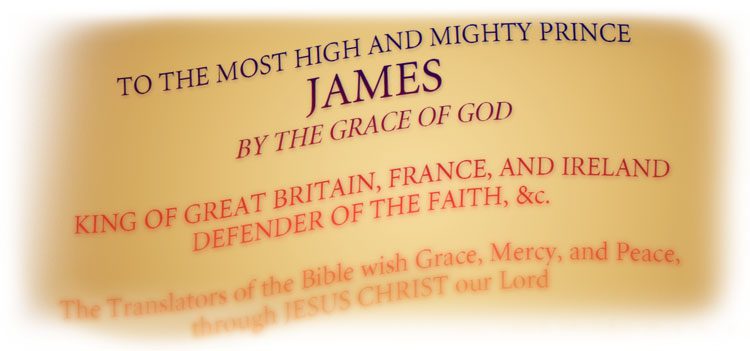In celebration of the 400th anniversary of the King James Bible, Queen Elizabeth II participated in a ceremony held at England’s famed Westminster Abbey.
Attending the service, along with the Queen, were members of the royal family, including Prince Charles and Prince Philip, and around 2,000 other guests. The churchgoers watched as the 1611 translation was presented to the altar.
The King James Bible represents a significant achievement for England. The version was created by 47 of the country’s brightest scholars, and it was compiled in Oxford, Cambridge, and Westminster. The King James Bible was published after 7 years of intelligent deliberation and translation, and the translation was eventually read in every Anglican Church in the country.
Someone referred to the King James Bible as the “DNA of the English language.” Hundreds of words and expressions that are part of our everyday language come from its sacred pages. Phrases, such as • “the powers that be,” • “signs of the times,” • “the writing on the wall,” • Let there be light • Land of the living • Wolf in sheep’s clothing • Am I my brother’s keeper? • Letter of the law • The writing on the wall • How are the mighty fallen • Twinkling of an eye • Skin of his teeth • Stumbling stone • Leopard change his spots? • Thorn in my side • Fly in the ointment • Blind leading the blind • Fall from grace Two-edged sword • Sour grapes • Salt of the earth • Cup of wrath • Broken heart
The King James Bible was not the first version of the Bible in English, but by the 1700s, it was widely accepted for use in Anglican and Protestant churches.
Here are some interesting truths about the King James Bible
•In 1620, an early edition of the King James Bible was brought to America on the Mayflower by John Alden, a member of the ship’s crew who stayed in the new world as a colonist
• Over the next few decades, the King James Bible overtook the Geneva Bible to become the preeminent Bible in the American colonies
• In 1789, George Washington was sworn in using a 1767 edition of the King James Bible printed in London, and set the stage for the longstanding tradition of swearing in Presidents at their presidential inaugurations.
• In 1861, Abraham Lincoln was sworn in during his first inauguration using an 1853 Oxford University Press edition of the King James Bible.
• Known as the Lincoln Bible, the same bible was used to swear in Barak Obama during his 2009 inauguration, where commentary focused on the historic link between Obama, the first African American president, and Lincoln, traditionally known as the Great Emancipator.
• During the Civil War, over 3 million King James Bibles were distributed to both Union and Confederate troops; in his second inaugural address, President Lincoln said of the troops that, “Both read the same Bible, and pray to the same God.”
• An 1889 Oxford edition of the King James Bible was presented to former slave Frederick Douglass when he departed to Haiti as the United States resident minister and consul-general
• In 1963, Rev. Martin Luther King’s famous “I have a Dream” speech was influenced by the following King James Bible passages: Psalms 30:5, Isaiah 40:4 and Amos 5: 24.
In Reading about this marvelous historical event I am reminded of Jeremiah’s powerful picturesque words in Chapter 23:29, “Is not my word like as a fire? says the LORD; and like a hammer that breaks the rock in pieces?”
In my mind’s eye I can see a powerful hammer pulverizing a mighty rock that no human hands could ever hope to shattering. In this text, however, the “rock” is literally a mighty rock mountain.
The purpose of the hammer is to “break in pieces.” This phrase actually is a single Hebrew word which normally means “disperse,” or “scatter abroad,” usually used in describing the worldwide dispersion of the children of Israel. It was used even earlier for the first dispersion at Babel: “So the LORD scattered them abroad from thence upon the face of all the earth” (Genesis 11:8). Perhaps most significantly of all, it is used in the prophecy of Zechariah 13:7: “Smite the shepherd, and the sheep shall be scattered.”
This awesome verse was quoted by the Lord Jesus just after the last supper and applied to Himself: “All ye shall be offended because of me this night: for it is written, I will smite the shepherd, and the sheep of the flock shall be scattered abroad” (Matthew 26:31). Combining all these themes, our text really seems to be saying: “Is not my word like a mighty hammer from heaven that shatters the great mountain and scatters it abroad?”
Our text is inserted in the midst of a stinging rebuke by Jeremiah of Israel’s false prophets, contrasting their lies with the mighty power of God’s true Word. Perhaps it is also a parable of the living Word, who is also the great Rock of ages, as well as the loving Shepherd. When the Rock was shattered, the living stones were ejected from the Rock. The sheep that were thus scattered from the Shepherd became the spreading fire of the written Word, and “they that were scattered abroad went every where preaching the word” (Acts 8:4)
Four hundred years is a long time. But the Bible is a book that is 3,500 years old and has been translated into 2,572 + languages. Other influential books come and go and lose their relevancy, but the Bible is forever new because it speaks to the deepest depths of our emotions and spiritual need, which is salvation from our sins through the blood of Jesus Christ.
“The grass withers, the flower fades, but the word of our God will stand forever. …(Isaiah 40:8)
Be Encouraged,
Pastor Bob

